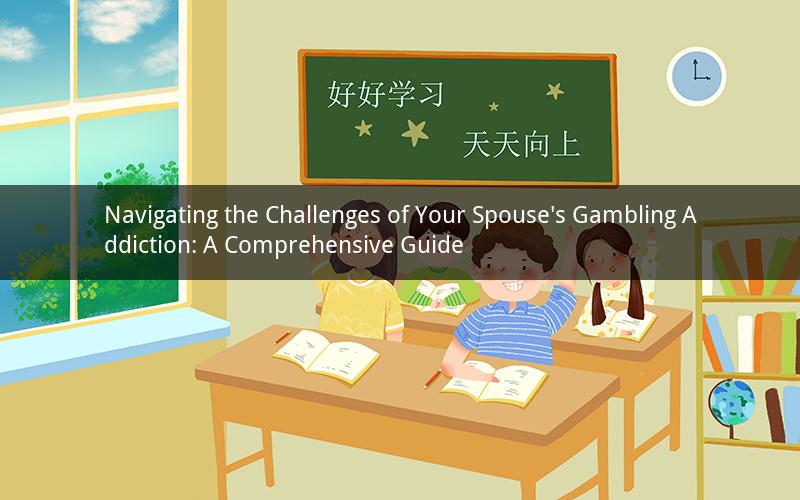
Gambling addiction can be a difficult issue to address, especially when it involves your spouse. It's important to approach the situation with empathy, understanding, and a commitment to finding a solution. This article aims to provide you with a comprehensive guide on how to deal with your spouse's gambling addiction, from identifying the problem to seeking professional help and rebuilding your relationship.
1. Recognizing the Signs of Gambling Addiction
The first step in dealing with your spouse's gambling addiction is to recognize the signs and symptoms. Common indicators include:
- Secretive behavior: Your spouse may hide their gambling activities or lie about their spending.
- Financial difficulties: You may notice a sudden decrease in the household budget or unexplained debts.
- Emotional changes: Your spouse may become irritable, anxious, or depressed as a result of their addiction.
- Social withdrawal: They may stop attending social events or spending time with family and friends.
2. Understanding the Impact of Gambling Addiction
Gambling addiction can have a profound impact on both you and your spouse. It's crucial to understand the emotional, financial, and psychological consequences of this addiction:
- Emotional toll: You may experience feelings of sadness, anger, fear, and betrayal. Your spouse may also suffer from feelings of shame, guilt, and regret.
- Financial burden: Gambling addiction can lead to significant financial loss, which can result in debt, eviction, or bankruptcy.
- Relationship strain: Infidelity, lying, and financial issues can strain your marriage, leading to trust issues and emotional distance.
3. Communicating with Your Spouse
Opening up a conversation with your spouse about their gambling addiction can be challenging. Here are some tips to help you navigate this delicate situation:
- Choose an appropriate time and place: Find a quiet, private setting where you can talk without interruptions.
- Use "I" statements: Express your concerns using "I" statements, such as "I feel scared when I think about the debt you owe" or "I feel hurt when I find out you've been lying to me."
- Avoid accusations: Refrain from using accusatory language, as this may lead to defensiveness or denial.
- Be empathetic: Show understanding and empathy, acknowledging that your spouse may be struggling with their addiction.
4. Encouraging Your Spouse to Seek Professional Help
Encouraging your spouse to seek professional help is a critical step in overcoming their gambling addiction. Here's how you can support them:
- Research treatment options: Gather information about different types of treatment, such as therapy, support groups, or residential programs.
- Offer to help: Be willing to provide transportation, child care, or other support needed for your spouse to attend treatment.
- Encourage participation: Encourage your spouse to actively participate in treatment and support groups, as this can significantly improve their chances of recovery.
5. Taking Care of Yourself
It's important to prioritize your well-being while helping your spouse deal with their gambling addiction. Consider the following self-care strategies:
- Seek support: Join a support group or seek counseling to help you cope with the emotional toll of your spouse's addiction.
- Establish boundaries: Set healthy boundaries in your relationship, such as limiting contact with their gambling friends or controlling access to funds.
- Focus on positive activities: Engage in hobbies or other activities that promote well-being and distract you from the stress of your spouse's addiction.
6. Rebuilding Your Relationship
Once your spouse has begun the recovery process, it's essential to work on rebuilding your relationship:
- Communicate openly: Continue to communicate openly and honestly with your spouse, discussing both your feelings and their progress in treatment.
- Forgiveness: Understand that recovery is a gradual process, and it's important to practice forgiveness and patience.
- Rebuild trust: Work on rebuilding trust by setting boundaries and being transparent with each other.
- Support each other: Encourage each other to continue the recovery journey and celebrate small victories along the way.
Frequently Asked Questions:
1. Q: How long does it take for a person to recover from a gambling addiction?
A: The length of time it takes for someone to recover from a gambling addiction can vary. Some individuals may recover within a few months, while others may require years of treatment and support.
2. Q: Can a person ever completely recover from a gambling addiction?
A: While complete recovery from a gambling addiction is possible, it often requires ongoing commitment to the recovery process. Some individuals may experience relapses, but with continued treatment and support, they can overcome these challenges.
3. Q: Should I confront my spouse about their gambling addiction if they deny having a problem?
A: It can be challenging to confront your spouse about their gambling addiction if they deny having a problem. However, it's important to express your concerns and encourage them to seek professional help. You can offer support and understanding, but it's ultimately their decision to address the addiction.
4. Q: Can my spouse's gambling addiction cause legal problems?
A: Yes, gambling addiction can lead to legal problems, such as financial fraud, theft, or embezzlement. If your spouse is engaging in illegal activities to support their gambling habit, it's essential to seek legal advice and support.
5. Q: How can I ensure that my relationship with my spouse will survive the gambling addiction?
A: Ensuring that your relationship with your spouse survives the gambling addiction requires open communication, empathy, and a commitment to rebuilding trust. It's important to prioritize self-care, seek support, and be patient throughout the recovery process.